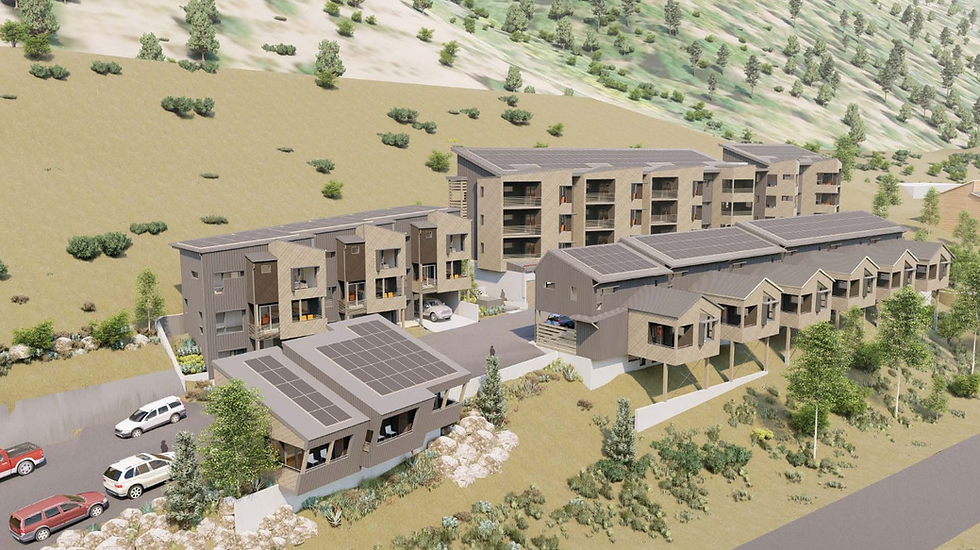- Amendment Admin
- Jul 28
- 4 min read
Updated: Sep 25

Understanding the Financing Behind Canyonlands
The development underway at Canyonlands, located by Clark's Grocery Store, is financed in a unique way for the Town of Telluride. The Town is leasing the land under a 30-year agreement to a third-party developer who will construct the project. A few years ago, the Town purchased the Canyonlands property for $3,000,000 and already owned the Tower House land.
The total cost of the project is $26,575,000. This amount will be bonded against the property itself as collateral. Upon completion, the Town will own just 0.1% of the project. Since the Town is building this project without assuming direct future liability for debt, there is no legal requirement for voter approval.
Project Details
The Canyonlands project will consist of 28 rental units, many of which are smaller, and 11 units for sale. This includes three townhouses, each approximately 2,220 sq. ft. When factoring in the cost of the land, the project will cost about $1,040 per square foot before any financing costs ($29 million / 28,575 livable sq. ft.). According to the THA document, the purpose of the units for sale is to "buy down the debt of the rental portion of the Project, to maintain affordability in perpetuity." Additionally, both the rental and affordable sale portions of the project are required to target an average affordability of 120% AMI, with a range of 80% AMI to 150% AMI. No units can be priced beyond 150% AMI. (p. 3)
Interestingly, while the originally approved documents made no mention of market-rate sales, a recent Town Manager's update suggests that three of the eleven units for sale will be sold at market rate.

Market Rate Units and Potential Profits
It is possible that the free market units will sell for more than their $2.3 million cost. However, the exact amount buyers will pay remains uncertain. Currently, the average price per square foot in Telluride is around $1,800 for residential property. This would suggest a sale price of approximately $4 million for the townhouses, resulting in a profit of $1.7 million each, or about $5 million total if everything goes as planned.
If the sale of the market-rate units reduces financing costs by $5 million, the overall monthly financing costs would decrease from about $155,000 to around $125,000 (at 6%). However, the rental units at 120% AMI are expected to generate only about $63,000 per month, covering two-thirds of the total finance cost of approximately $100,000.

The Challenge of Affordability
The five other subsidized AMI units for sale will require additional subsidies to make them affordable for buyers at 150% AMI. A rough estimate suggests that this subsidy could be around $10,000 per month for the eight AMI units.
As the saying goes, the math does not appear to be adding up.
Town's "Moral Obligation"
What happens if the math does not add up, and there are significant financing costs exceeding the income generated each month? The Town has agreed to a "Moral Obligation" for the debt, but not a legal one. This situation can be confusing.
To avoid triggering a vote from the electorate, which occurs when there is a long-term debt obligation against the Town's general fund, the Town opted for a “Moral Obligation” instead. According to the Town, "pursuant to the Resolution, it is the intention and expectation of the Town Council to appropriate such funds as requested, within the limits of available funds and revenues, but this declaration of intent shall not be binding upon the Town Council or any future Town Council in any future year.” There is no "general obligation or other indebtedness or multiple fiscal year direct or indirect debt.” (p. 5)
This means the Town can, but is not required to, step in and make the debt payments to avoid foreclosure by the bank and a potential loss of the property. The Town has made this "Moral Obligation" in various debt deals, such as VooDoo, Sunnyside, and others.
While the concept of a "Moral Obligation" may seem humorous—suggesting that failure to pay equates to acting "immorally"—it raises questions about how genuine this obligation is. Banks seem to believe that the Town will step in and cover the difference, as they offer better interest rates under these terms.
If, for instance, the income from the Canyonlands property falls short of covering the monthly finance charges, the Town will face the prospect of either losing the property in foreclosure—an embarrassing outcome—or stepping in to cover the monthly debt balance.
If the Town chooses not to fulfill this Moral Obligation, thereby acting "immorally," would any lender be willing to work with the Town again? Highly doubtful. It appears that the Town would have little choice but to step in and pay if income proves insufficient.
Is the Project Doomed to Fail?
Based on the numbers presented, it seems unlikely that the three market units will cover the financing costs of the rental units. For the AMI-restricted units, individuals with an AMI income of 150% can only afford to spend about one-fourth of the monthly financing cost. This indicates that substantial subsidies will be necessary to make these units affordable.
If the Town plans to provide significant future subsidies for the AMI-restricted sale units, such a subsidy should be disclosed. This transparency is crucial, as it would require a vote from the people for long-term debt approval.
The Town might have a magic bullet to make this math work, but requiring such projects to receive voter approval necessitates clarity on how the developer can spend over $1,000 per square foot and still maintain affordability without substantial subsidies from the Town.
Of course, there's always the risk of a recession causing all the math to go awry, potentially leading to the loss of all recently built affordable housing. Is this a serious risk?
Inquiring minds would like to know.





Comments